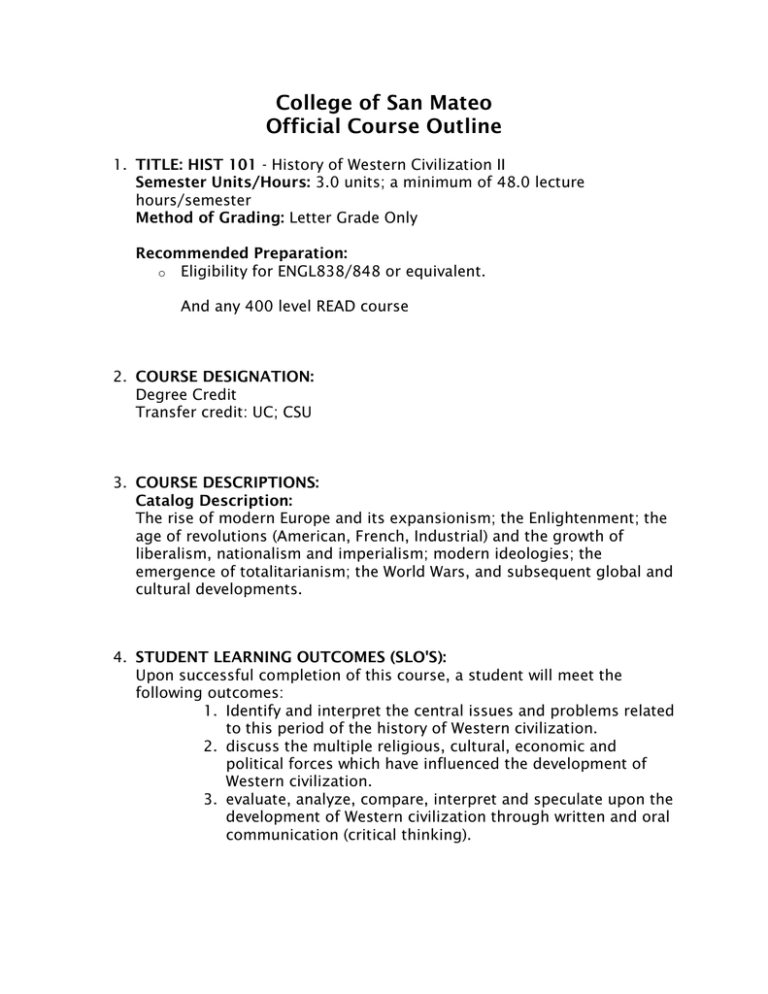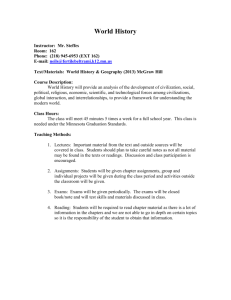College of San Mateo Official Course Outline
advertisement

College of San Mateo Official Course Outline 1. TITLE: HIST 101 - History of Western Civilization II Semester Units/Hours: 3.0 units; a minimum of 48.0 lecture hours/semester Method of Grading: Letter Grade Only Recommended Preparation: o Eligibility for ENGL838/848 or equivalent. And any 400 level READ course 2. COURSE DESIGNATION: Degree Credit Transfer credit: UC; CSU 3. COURSE DESCRIPTIONS: Catalog Description: The rise of modern Europe and its expansionism; the Enlightenment; the age of revolutions (American, French, Industrial) and the growth of liberalism, nationalism and imperialism; modern ideologies; the emergence of totalitarianism; the World Wars, and subsequent global and cultural developments. 4. STUDENT LEARNING OUTCOMES (SLO'S): Upon successful completion of this course, a student will meet the following outcomes: 1. Identify and interpret the central issues and problems related to this period of the history of Western civilization. 2. discuss the multiple religious, cultural, economic and political forces which have influenced the development of Western civilization. 3. evaluate, analyze, compare, interpret and speculate upon the development of Western civilization through written and oral communication (critical thinking). 5. SPECIFIC INSTRUCTIONAL OBJECTIVES: Upon successful completion of this course, a student will be able to: . same as student learning outcomes 6. COURSE CONTENT: Lecture Content: The course will cover, but will not be restricted to, the following topics: . A. B. C. D. E. F. G. H. I. J. K. L. M. N. O. P. Q. R. Absolutism and Parliamentarism The Scientific Revolution The Baroque Age and Era of Louis XIV The Age of Enlightenment The Age of Revolutions: American, French, 1830, 1848, etc. Reaction and Reform in the 19th Century' Nationalism and Romanticism Imperialism and Colonialism Industrial Revolution Modernism The Great War Bolshevism, Fascism and Nazism Second World War The Cold War The End of Colonialism Western World and the Third World Internationalism and Globalism Cultural and Social Change Challenges of the Contemporary World 7. REPRESENTATIVE METHODS OF INSTRUCTION: Typical methods of instruction may include: . Lecture A. Discussion B. Other (Specify): Lecture/Discussion format in the classroom; reading and writing assignments in primary sources and secondary texts to enhance analytical and comprehension skills; field work (e.g., museum visits and reports); written reviews of primary or secondary materials; films, slides, the Internet, DVDs, videotapes, CDs and televised programs to enhance the classroom experience; group discussions and presentations; library assignments. Out-ofClass Assignments: Required readings from primary and secondary sources, exercises, and written responses as required by professor. Be prepared to discuss questions such as the following: Example 1: In what ways does the Edict of Nantes (1598) balance the demands of both French Catholics and Calvinists? Example 2: According to Mary Astell in her Reflections upon Marriage (1706), what is women?s customary status is society, and why? Example 3: According to La Pasionaria?s ?Farewell Address? of 1 November 1938, why did the volunteers of the International Brigades come to fight in the Spanish Civil War? 8. REPRESENTATIVE ASSIGNMENTS Representative assignments in this course may include, but are not limited to the following: . Writing Assignments: Regular essay writing to be assigned as part of the overall evaluation for the course. A. Reading Assignments: Regular reading assignments from the required textbooks and other primary sources will be made through the instructor's syllabus. 9. REPRESENTATIVE METHODS OF EVALUATION Representative methods of evaluation may include: . Quizzes A. Written examination B. Periodic written examinations and quizzes, midterm, final examination. Comprehension of material and analytical ability are among the bases for assessing student progress. The instructor can also bring in class participation as well as written or oral reports into the overall evaluation. 10. REPRESENTATIVE TEXT(S): Possible textbooks include: o Lynn, Hunt et al.. The Making of The West, Volume II, 3 ed. Bedford/St. Martin's, 2010 o Kagan, Donald et al.. The Western Heritage, Volume II, 10 ed. Prentice Hall, 2009 o Kishlansky, Mark, et al.. Civilization in the West, Volume II, 7 ed. Longman, 2007 o Mckay, David, et al.. A History of Western Society, Volume II, 10 ed. Bedford/St. Martin's, 2010 o Spielvogel, Jackson. Western Civilization, Volume II, 8 ed. Wadsworth, 2011 Other: o Dushkin Annual Editions (changes each year) Origination Date: August 2010 Curriculum Committee Approval Date: April 2012 Course Originator James Robertson


